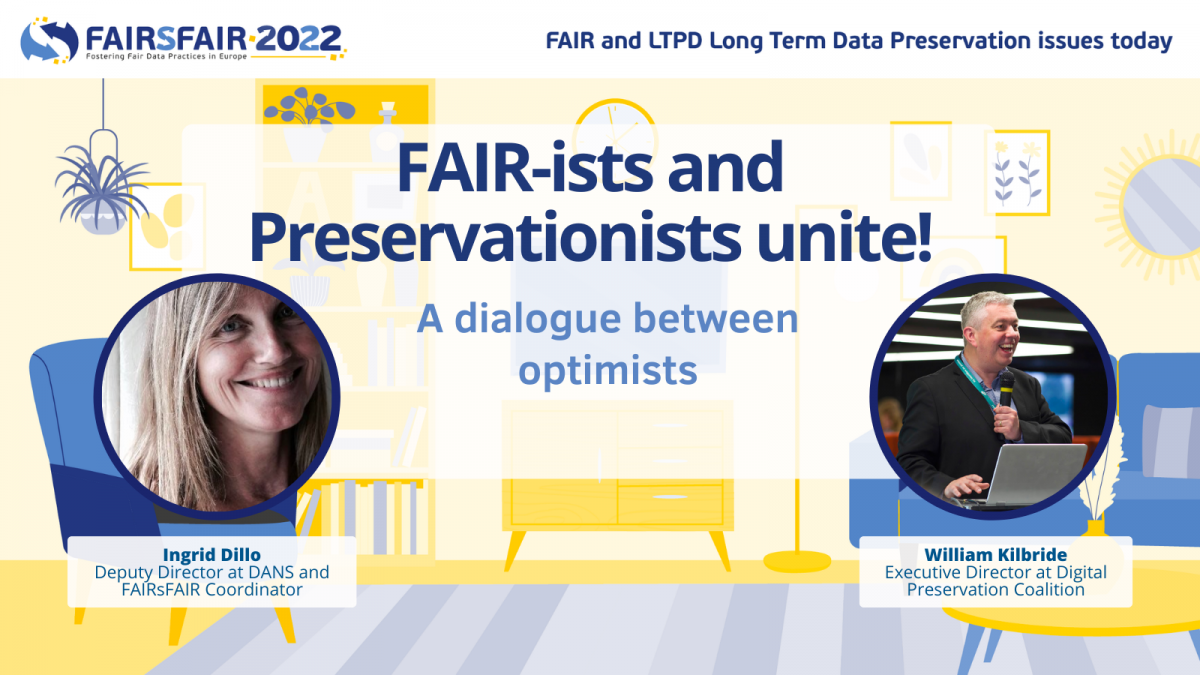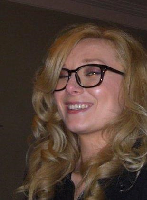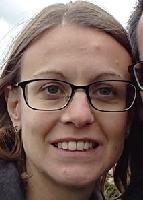Blog
Unless otherwise stated, content is shared under CC-BY-NC Licence
Catastrophic data loss is going to cost us how much….?!
Paul Stokes is Product Manager for Jisc
Losing your data may well cost you a LOT more that you thought. How much more? That's a difficult question to answer, but one that Jisc and the Digital Preservation Coalition are looking to answer…
FAIR-ists and Preservationists unite! A dialogue between optimists
Ingrid Dillo is Deputy Director at DANS and FAIRsFAIR Coordinator and William Kilbride is Executive Director at Digital Preservation Coalition.
The FAIRsFAIR Project held an online conference in January 2022 to mark the completion of its work. It included a conversation between Ingrid and William about digital preservation in the context of the FAIR principles. We've published the text of the interview here, and it's available as a recording too also on the FAIRsFAIR website where there's a lot more about the project and its outputs.
Introducing the “World Cup of Digital Preservation”
This year marks the 20th anniversary of the founding of the Digital Preservation  Coalition, and we’re planning a series of activities throughout 2022 to celebrate. The more formal events will happen in coordination with the iPres 2022 conference in Glasgow, including a special edition of the Digital Preservation Awards. But the DPC was launched at a gala reception in the House of Lords in London, in late February 2002.We couldn’t let this month pass without having some fun!
Coalition, and we’re planning a series of activities throughout 2022 to celebrate. The more formal events will happen in coordination with the iPres 2022 conference in Glasgow, including a special edition of the Digital Preservation Awards. But the DPC was launched at a gala reception in the House of Lords in London, in late February 2002.We couldn’t let this month pass without having some fun!
Knowledge in, knowledge out: an update on work with the Nuclear Decommissioning Authority
For three years now, the DPC has been working alongside colleagues at the UK Nuclear Decommissioning Authority (NDA) on their digital preservation challenges. It has been a little while since we blogged about this project, but I wanted to take the opportunity to let you know about some of the outputs that have been released over the last year and mention some new work to look out for in the near future.
State of the (rock) art: Archiving Scotland's Rock Art Project
Freddie Alexander is Digital Archivist at Historic Environment Scotland.
In December 2021 Scotland’s Rock Art Project (ScRAP) came to an end. ScRAP was a five-year project funded by the Arts and Humanities Research Council (AHRC) and hosted by Historic Environment Scotland (HES). It was the first major archaeological research project into prehistoric rock art in Scotland, and one of the largest and most ambitious rock art projects in the world. During the project the ScRAP team co-produced with community groups a wealth of digital data, including photographs, digitised sketches, close-range photogrammetry models, and an extensive database of fieldwork data for over 1100 prehistoric rock art panels across Scotland.
It's beginning to look a lot like
As the song goes, 'it’s beginning to look a lot like Christmas', but not any old Christmas: it’s beginning to look a lot like 2020 again.
Granted I am farther behind this year even than last, in part because we’ve been isolating and just a bit distracted lately. (I’ll spare the details except to say the supermarket delivery driver didn’t want his crates back.) I also don’t really remember the stresses and strains of 2020. My self-preserving brain seems to have erased the worst so all I can bring to mind are the kindnesses and patience elicited by that first pandemic Christmas. As for 2021, I find myself staring at a small pile of Christmas cards for close friends and family completely at a loss as to what to write.
This blog is a poor replacement for the DPC Christmas card this year.
Investing in our Digital Future
Hannah Smith is the Digital Repository Manager at Historic Environment Scotland.
HES Archives Digital Repository is awarded Core Trust Seal accreditation
“A digital future is really the only hope for these things…” was a comment made to me by a colleague regarding the degradation of some colour slides in our collection. These conversations are becoming more and more prevalent in archives, with digitisation and digital preservation becoming one of the biggest risks to archives in recent years. Historic Environment Scotland has been developing its digital archive since the early 1990s and in recent years has had significant investment to develop further.
In October 2021, the HES Archives Digital Repository was awarded CoreTrustSeal certification. Certification is based on requirements established by the World Data Systems (WDS) and the Data Seal of Approval (DSA) reflecting the core characteristics of trustworthy data repositories. HES is the accredited digital repository for heritage data in Scotland, and along with the Archaeology Data Service (ADS), one of only two accredited repositories for heritage data in the UK. CTS certification provides both depositors and funding agencies with the reassurance that data deposited with HES is preserved and remains accessible for future generations.
Unprecedented times
Hania Smerecka is Archivist at Lloyds Banking Group
I sat down to write this during a violent flurry of Whatsapp pings - friends discussing fresh instructions to work from home. I’m not sure how the latest announcements make me feel. Nervous probably, but lucky too, as we got through the last two years safely, adapted, and are in pretty good shape to face whatever is coming.
Our Preservica cloud instance had not yet gone live when Covid first hit the news. We were still finding our way with the application when lockdown entered the banana bread phase. Loo roll shortages were raging while we set up our Calm link and our backlog ingests were running when NHS trusts started appealing for PPE. I was preparing training sessions while *those* Downing Street cheese and wines were or were not taking place.
Digital Preservation and Environmental Sustainability: Five Themes for the Future
[sigue la versión en español]
In November I was invited to speak to the members of RIPDASA in Latin America on the theme of environmental sustainability and digital preservation. This presentation gave me scope to expand a short provocation given on the same theme on the fringes of COP26 which we have also published. It is not exactly a deep dive, but more than a toe in the water. You can also watch the video of the presentation which includes Spanish subtitles.
Thank you very much for the invitation to join you today to share some thoughts about the relationship between digital preservation and environmental sustainability. There’s quite a lot we could say on this issue, so I’d like to cover a lot of ground in the next 15 minutes or so. I have 5 themes.
Firstly, I want to define the digital preservation problem as this will help establish the scope for discussion that follows. Then I want to clarify the relationship between preservation and disposal and look at the opportunities that digital preservation creates to manage and reduce the amount of data we retain. I will then dig a bit more deeply into the ways in which digital preservation consumes energy and the implications that arise from efforts to reduce this consumption. The origin of the energy also matters tremendously as do expectations about access. Towards the end I will take a brief detour into the history of digital preservation as this is not irrelevant to our work. Changes which will disrupt the digital economy will also disrupt our understanding of digital preservation. Finally, I want to reflect on the DPC and how we’re beginning to make changes in our own work.
A Hybrid Model for Web Archive Capture
Claire Newing is Web Archivist at The National Archives in the UK
2021 is the year the UK Government Web Archive came of age. On 4 November we celebrated the 25th birthday of our oldest resource - this archived version of the Environment Agency website. Of course it shared its birthday with World Digital Preservation Day 2021 so a double excuse to celebrate.


























































































































































